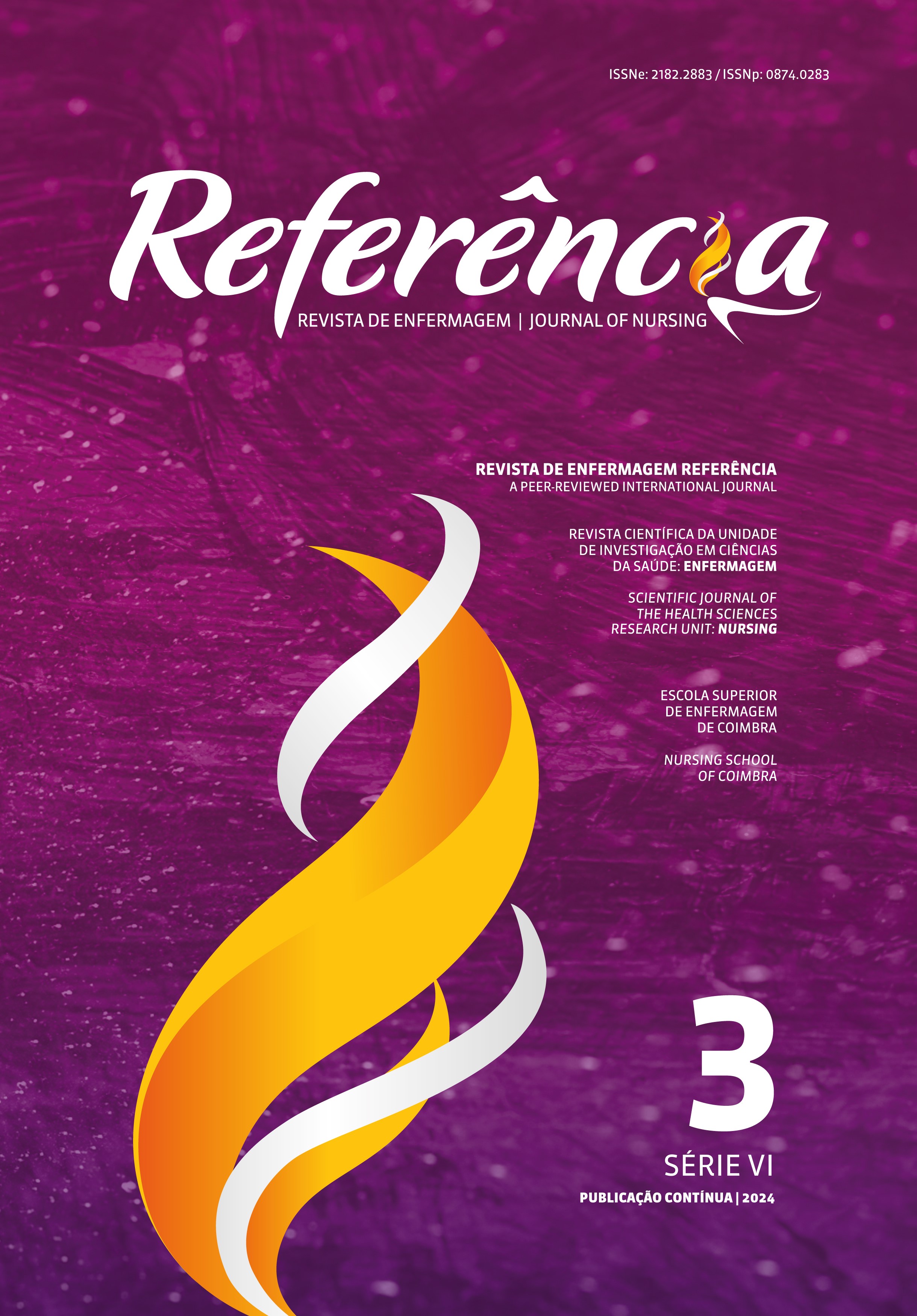Promoción de la salud mental materna perinatal: Prototipo de curso de intervención en cuidados de salud primarios
DOI:
https://doi.org/10.12707/RVI24.26.34656Palabras clave:
salud mental, educación sanitaria, atención perinatal, grupos de discusiónResumen
Marco contextual: Estudios nacionales e internacionales destacan la necesidad de promover la salud mental materna (SMM) en la transición a la maternidad. Los trastornos mentales en este período afectan a madres, padres y niños en desarrollo, lo que lo convierte en un problema de salud pública.
Objetivo: Desarrollo de un prototipo de curso de promoción de la SMM en el periodo perinatal, para entornos de Cuidados de Salud Primarios (CSP).
Metodología: Estudio cualitativo y descriptivo con tres grupos de discusión (N = 29): mujeres em barazadas y sus parejas; madres y sus parejas con hijos de hasta 12 meses; profesionales sanitarios de los CSP. Información transcrita, analizada mediante análisis temático inductivo con el NVivo-12. Cumplidos los requisitos éticos.
Resultados: A partir de las experiencias emocionales maternas, los factores de riesgo y protección percibidos y las sugerencias de áreas temáticas, se identificaron los componentes del prototipo, que integran ocho áreas temáticas a desarrollar en el curso de promoción de la SMM en un contexto de CSP en el embarazo y posparto, hasta los 12 meses.
Conclusión: Este estudio contribuyó al diseño de un prototipo de curso para promover la SMM en CSP en el periodo perinatal.
Descargas
Citas
Arrais, A., Mourão, M., & Fragalle, B. (2014). Pré-natal psicológico como programa de prevenção à depressão pós-parto. Saúde e Sociedade, 23(1), 251-264. https://doi.org/10.1590/S010412902014000100020
Camarneiro, A. P., & Justo, J. M. (2020). Emotional states and psychopathological symptoms in couples during pregnancy and post-partum. Journal of Reproductive and Infant Psychology, 4(4),384-398. https://doi.org/10.1080/02646838.2020.1814226
Colman, L., & Colman, A. (1994). Gravidez: A experiência psicológica. Lisboa: Edições Colibri.
Drozd, F., Haga, S., Brendryen, H., & Slinning, K. (2015). An Internet-based intervention (mamma mia) for postpartum depression: Mapping the development from theory to practice. JMIR Research Protocols, 4(4), 1- 17. https://doi.org/10.2196/resprot.4858
Fisher, J. R., Wynter, K. H., & Rowe, H. J. (2010). Innovate psycho-educational program to prevent common postpartum mental disorders in primiparous women: a before and after controlled study. BMC Public Health, 10(432), 1-15. https://doi.org/10.1186/1471-2458-10-432
Guerra, M. J., Braga, M. C., Quelhas, I., & Silva, R. (2014). Promoção da saúde mental na gravidez e no pós-parto. Revista Portuguesa de Enfermagem de Saúde Mental, (Ed.Esp.1), 117-124.
Haga, S.M., Drozd, F., Lisøy, C., Wentzel-Larsen, T., & Slinning, K. (2018). MammaMia – A randomized controlled trial of na internet-based intervention for perinatal depression. Psychological Medicine 1–9. https://doi.org/10.1017/S0033291718002544
Harvey, S. T., Bennett, J. A., Burmeister, E., & Wyder, M. (2018). Evaluating a nurse-led community model of service for perinatal mental health. Collegian, 25. https://doi.org/10.1016/j.colegn.2017.12.005
Macedo, A.F., & Pereira, A. T. (Coords) (2014). Saúde Mental Perinatal. Lisboa: Lidel.
Marques, M., Pereira, A.T., Bos, S., Soares, M.J., Maia, B.R., Valente, J., & Macedo, A.F. (2014).
Aspetos clínicos e fatores de risco psicossociais da depressão perinatal. In A.F. Macedo & A.T.
Pereira (Coords), Saúde Mental Perinatal (pp. 27- 49). LIDEL.
Monteiro, A.P., & Mendes, A. (2013). Multicultural care in nursing-From the theoretical paradigm to the subjective experiences in clinical settings. Open Journal of Nursing, 3(8), 557-562. https://doi.org/10.4236/ojn.2013.38076
Nagle, U., & Farrelly, M. (2018). Women’s views and experiences of having their mental health needs considered in the perinatal period. Midwifery, 66, 79-87. https://doi.org/10.1016/j.midw.2018.07.015
Ramalho, G. C., Alves, B. P., Temoteo, R. C., Nascimento, M. B., Fernandes, P. K.,Freitas, F. F., & Fernandes, M. C. (2023). Experiências e sentimentos vivenciados pelas mulheres na gestação. Revista de Enfermagem Referência, 6(2), e31100. https://doi.org/10.12707/RVI23.56.31100
Tripathy, P. (2020). A public health approach to perinatal mental health: Improving health and wellbeing of mothers and babies. Journal of Gynecology Obstetrics and Human Reproduction, 49, 101747. http://dx.doi.org/10.1016/j.jogoh.2020.101747
Wang, Z., Liu, J., Shuai, H., Cai, Z., Fu, X., Liu, Y., Xiao, X., Zhang, W., Krabbendam, E., Liu, S., Liu, Z., Li, Z, & Yang, X. (2021). Mapping global prevalence of depression among postpartum women. Translational Psychiatry, 11, 543. https://doi.org/10.1038/s41398-021-01663-6
Watson, H., Harrop, D., Walton, E., Young, A., & Soltani, H. (2019). A systematic review of ethnic minority women’s experiences of perinatal mental health conditions and services in Europe. PLOS ONE,14(1), e0210587. https://doi.org/10.1371/journal.pone.0210587
World Health Organization. (2009). Mental health aspects of women’s reproductive health: A global review of the literature. World Health Organization. WPA (2017). The WPA Perinatal mental health position statement. https://www.who.int/publications-detail-redirect/9789241563567
Wylie, L., Holiins Martin, C. J., Marland, G., Martin, C. R., & Rankin, J. (2011). The enigma of post-natal depression: an update. Journal of Psychiatric and Mental Health Nursing, 18, 48-58. https://doi.org/10.1111/j.1365-2850.2010.01626.x
Yin, X., Sun, N., Jiang, N., Xu, X., Gan, Y., Zhang, J, Qiu, L., Yang,C., Shi, X., Chang, J., & Gong, Y. (2021). Prevalence and associated factors of antenatal depression: Systematic reviews and meta-analyses. Clinical Psychology Review, 83, 101932. https://doi.org/10.1016/j.cpr.2020.101932

















